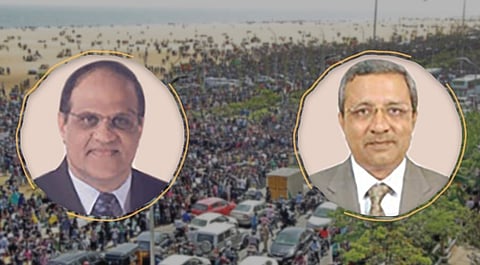
- Latest Legal News
- News
- Dealstreet
- Viewpoint
- Columns
- Interviews
- Law School
- Legal Jobs
- हिंदी
- ಕನ್ನಡ

The Madras High Court today held that the iconic Marina Beach cannot be demanded as a protest venue under the guise of exercising the right to free speech and expression.
A Division Bench of Justices KK Sasidharan and R Subramanian cited reasonable restrictions to Article 19 of the Constitution, and in particular the interest of public order, while upholding the Tamil Nadu Government’s decision to disallow protests at Marina Beach.
In the lead judgment, Justice Subramanian rationalised the verdict as follows,
“The right to protest, no doubt is available to all the citizens in a democratic country like ours. Unfortunately, this right to protest has been continuously misunderstood as a right to inconvenience the general public.
The protesters who claim to espouse the cause of the public, often forget that their right to protest ends when the other person’s right to free movement and ‘right to not to listen to’ starts.“
On this aspect of right to not listen, Justice Sasidharan has also emphasised as follows.
“The Constitution of India guarantees right to freedom of speech under Article 19(1)(a) which would include by implication, the right not to listen to the speech… A citizen has no fundamental right to insist that his speech should be heard by an unwilling citizen. Similarly, it is not possible to compel a person to witness a procession, against his wishes.“
Relying on a number of Supreme Court cases, the Court held that there cannot be an unbridled right to organize protests or public meetings. Reference was also made to the Jantar Mantar case to emphasise that while a blanket ban on public protest is unconstitutional, the government has the right to place reasonable restrictions with regard to venue and timing of protests.
“No person, in our considered opinion, has a right to contend that he would protest only at a particular place and not anywhere else. The very fact that the right to protest is acknowledged as a fundamental right under the constitution, makes it subject to reasonable restrictions…
… We are therefore of the considered opinion that the petitioner/ respondent has no vested right to demand that he would conduct his protest or fast only at place chosen by him and not at the place offered by the Authorities.”
As echoed in Justice Sasidharan’s concurring judgement,
“…while recognising the fact that dialogue, dissent and deliberation are imperative and necessary in a democracy, other aspects like public order, safety and general public interest must also be given equal weightage and significance, which ultimately make up the true hallmark of a democratic welfare state. The State is therefore correct in regulating the Assembly at Marina in larger public interest.“
In this case, the Court was informed that the Chennai Corporation has already earmarked alternate venues for public protests at Valluvar Kottam, Chindadripet, and Chepauk.
The Court, therefore, ruled in favour of the state’s policy against Marina Beach protests, observing that an application can be made if required for permission to hold demonstrations in the designated areas. The Court recommended that this policy be adhered to strictly in the future.
Justice T Raja’s earlier order which had allowed a plea to hold a fast at Marina, to protest the delay in constituting a Cauvery Water Management Board was set aside.
Before parting with the case, the Court observed that certain exceptions can be made, such as homages to leaders whose memorials or statues are located on Marina, and the customary Republic Day parade or the conduct of awareness programmes by holding of marathons and rallies.
However, it was emphasised that such rallies should not cause public inconvenience.
“It is made clear that the awareness programmes should be permitted only during non-peak hours without any inconvenience to the general public.”